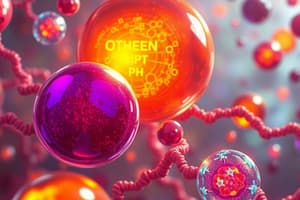Podcast
Questions and Answers
What is the main function of enzymes in living organisms?
What is the main function of enzymes in living organisms?
- To increase activation energy
- To decrease the rate of chemical reactions
- To remain unchanged after the reaction
- To act as biological catalysts and accelerate chemical reactions (correct)
Under what conditions does denaturation of enzymes occur?
Under what conditions does denaturation of enzymes occur?
- High heat and pH changes (correct)
- Low heat and high pH
- Low heat and neutral pH
- High heat and low salt concentrations
What property of enzymes allows them to dissolve in water, salt, glycerol, and alcohol?
What property of enzymes allows them to dissolve in water, salt, glycerol, and alcohol?
- Molecular weight
- Colloidal nature
- Solubility (correct)
- Precipitation
What factors does enzyme activity depend on?
What factors does enzyme activity depend on?
How do enzymes aid the human body?
How do enzymes aid the human body?
Which factor does not affect enzyme activity?
Which factor does not affect enzyme activity?
Under what conditions does denaturation of enzymes occur?
Under what conditions does denaturation of enzymes occur?
Which property of enzymes allows them to remain unchanged after the reaction?
Which property of enzymes allows them to remain unchanged after the reaction?
Which disease is NOT associated with markers involving enzymes?
Which disease is NOT associated with markers involving enzymes?
What is the main function of enzymes in living organisms?
What is the main function of enzymes in living organisms?
Flashcards
What is the primary function of enzymes?
What is the primary function of enzymes?
Enzymes are biological catalysts that speed up chemical reactions in living organisms.
What causes enzyme denaturation?
What causes enzyme denaturation?
Enzymes can lose their shape and function when exposed to extreme heat or pH changes.
What makes enzymes soluble?
What makes enzymes soluble?
Enzymes are soluble in water, salt, glycerol, and alcohol due to their polar nature.
What factors affect enzyme activity?
What factors affect enzyme activity?
Signup and view all the flashcards
How do enzymes benefit the human body?
How do enzymes benefit the human body?
Signup and view all the flashcards
Which factor DOESN'T affect enzyme activity?
Which factor DOESN'T affect enzyme activity?
Signup and view all the flashcards
What are the conditions for enzyme denaturation?
What are the conditions for enzyme denaturation?
Signup and view all the flashcards
What property allows enzymes to remain unchanged?
What property allows enzymes to remain unchanged?
Signup and view all the flashcards
Which disease isn't linked to enzyme markers?
Which disease isn't linked to enzyme markers?
Signup and view all the flashcards
What is the main function of enzymes in living organisms?
What is the main function of enzymes in living organisms?
Signup and view all the flashcards
Study Notes
Enzyme Functions and Properties
- The main function of enzymes in living organisms is to catalyze metabolic reactions, increasing reaction rates and efficiency.
Enzyme Denaturation
- Denaturation of enzymes occurs under conditions such as high temperatures, extreme pH, and exposure to organic solvents or heavy metals, causing the loss of their native structure and function.
Enzyme Solubility
- The property of enzymes that allows them to dissolve in water, salt, glycerol, and alcohol is their amphipathic nature, having both hydrophilic and hydrophobic regions.
Factors Affecting Enzyme Activity
- Enzyme activity depends on factors such as temperature, pH, substrate concentration, and the presence of inhibitors or activators.
Enzymes in the Human Body
- Enzymes aid the human body by facilitating various physiological processes, including digestion, energy production, and detoxification.
Factors Not Affecting Enzyme Activity
- The factor that does not affect enzyme activity is light.
Enzyme Reactivation
- Enzymes remain unchanged after a reaction due to their property of catalysis, allowing them to react multiple times without being consumed.
Enzyme-Related Diseases
- The disease NOT associated with markers involving enzymes is hypertension.
Studying That Suits You
Use AI to generate personalized quizzes and flashcards to suit your learning preferences.





